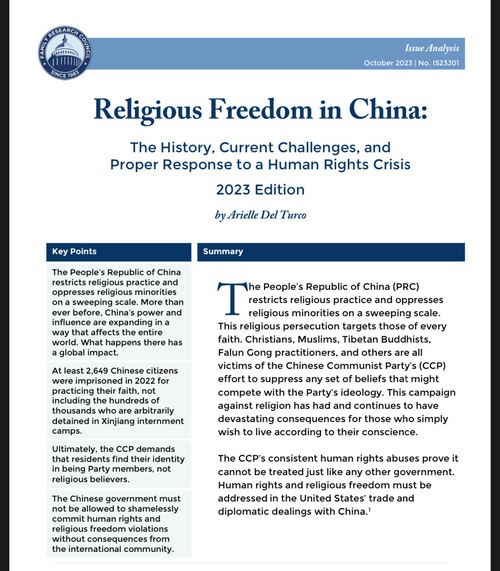(Minghui.org) The Family Research Council, a nonprofit research and educational organization, published its “Religious Freedom in China 2023 Edition” report in October 2023.
Its summary reads: “The People’s Republic of China restricts religious practice and oppresses religious minorities on a sweeping scale. This religious persecution targets those of every faith. Christians, Muslims, Tibetan Buddhists, Falun Gong practitioners, and others are all victims of the Chinese Communist Party’s (CCP) effort to suppress any set of beliefs that might compete with the Party’s ideology. This campaign against religion has had and continues to have devastating consequences for those who simply wish to live according to their conscience.”
 Screenshot of the first page of the report
Screenshot of the first page of the report
In the section about the persecution of Falun Gong, the report said that the human rights abuse “approaches a scale and brutality not seen since the atrocities of the Second World War.”
Below are excerpts from the report that focus on Falun Gong:
“Falun Gong (also known as Falun Dafa) is not a formal religion but a spiritual discipline based on a set of meditation exercises and texts that preach the virtues of truth, benevolence, and forbearance. Nevertheless, this rapidly growing practice raised the ire of the Chinese government in the late 1990s when it reached between 70 and 100 million adherents, thereby surpassing the number of CCP members at the time (63 million). In the wake of a decades-long effort to suppress traditional Chinese beliefs, the rising interest in spirituality was seen as a threat to the CCP.
“July 1999 marked the beginning of the government’s drive to eradicate the belief in Falun Gong. This effort included mass arrests, imprisonment in labor camps, brainwashing, and torture for anyone who refused to renounce their Falun Gong beliefs and practices. Authorities tortured practitioners as they tried to force them to renounce their faith and stop practicing—something that continues today
“The most horrifying form of persecution against the Falun Gong (and, at times, other religious minorities) is forced organ harvesting. This is the act of forcibly removing organs from prisoners of conscience and selling the organs. A team of researchers has proven that patients in China (including those who travel from abroad) are promised matching organs for transplant within a few days—an unbelievably short time compared to the wait in Western countries, which ranges from a few months to a few years. Such a quick turnaround for receiving organs is only possible with China’s forced procedures that take the lives of blameless Falun Gong believers.
“On June 17, 2019, the Independent Tribunal into Forced Organ Harvesting of Prisoners of Conscience in China concluded with certainty that Falun Gong adherents have been used as a primary source of forced organ harvesting.106 Human rights lawyers estimate that at least 65,000 Falun Gong practitioners have been killed for their organs since 2001. The Chinese government is making a substantial profit from organ trafficking. Global Rights Compliance suggests China gains at least 840 million USD each year from these endeavors, while some estimate profits are as high as 1.7 billion USD. Evidence suggests that patients from over 20 countries have traveled to China for transplants in what is now known as ‘transplant tourism.’”
In its policy recommendation, the report says, “The CCP’s consistent human rights abuses prove it cannot be treated just like any other government. Human rights and religious freedom must be addressed in the United States’ trade and diplomatic dealings with China.
“The Chinese government must not be allowed to shamelessly commit human rights and religious freedom violations without consequences from the international community.”
Copyright © 2023 Minghui.org. All rights reserved.









